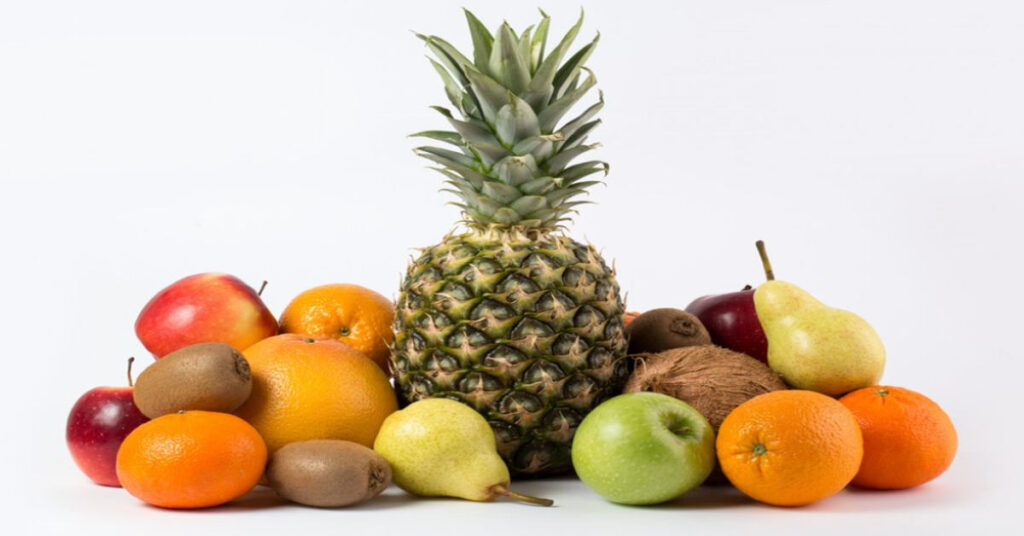Eating a healthy diet involves consuming a variety of foods that provide essential nutrients to support overall health and well-being. Here are some examples of healthy foods to include in your diet:
Fruits

Incorporate a variety of fruits, such as berries, apples, oranges, bananas, and kiwis. They are rich in vitamins, minerals, fiber, and antioxidants.
Fruits are nutrient-rich foods that provide a wide range of vitamins, minerals, fiber, and antioxidants, all of which are essential for maintaining good health. Here’s a breakdown of why fruits are beneficial:
- Nutrient-rich: Fruits are packed with essential vitamins and minerals such as vitamin C, potassium, folate, and various B vitamins. These nutrients are crucial for supporting immune function, bone health, energy metabolism, and overall well-being.
- Fiber: Fruits are an excellent source of dietary fiber, both soluble and insoluble. Fiber helps regulate digestion, promotes bowel regularity, and may help lower cholesterol levels and reduce the risk of certain chronic diseases such as heart disease, diabetes, and obesity.
- Antioxidants: Many fruits are rich in antioxidants such as vitamin C, flavonoids, and carotenoids. Antioxidants help neutralize harmful free radicals in the body, protecting cells from damage and reducing inflammation. Consuming a diet rich in antioxidants may lower the risk of chronic diseases and support overall health.
- Hydration: Most fruits have high water content, which can contribute to hydration. Staying hydrated is essential for numerous bodily functions, including temperature regulation, digestion, nutrient transportation, and detoxification.
- Low in Calories: Most fruits are naturally low in calories, making them a nutritious option for those looking to manage their weight or maintain a healthy weight. They provide sweetness without added sugars and can satisfy cravings for sweets in a healthier way.
To incorporate more fruits into your diet, aim to eat a variety of colorful fruits throughout the day. Fresh, frozen, or dried fruits are all good options. You can enjoy fruits as snacks, add them to smoothies, salads, yogurt, or oatmeal, or use them in cooking and baking recipes. By including a variety of fruits in your diet, you can reap their nutritional benefits and support your overall health and well-being.
Vegetables:

Include a diverse range of vegetables like leafy greens (spinach, kale), cruciferous vegetables (broccoli, cauliflower), bell peppers, carrots, and tomatoes. Vegetables provide essential nutrients, fiber, and antioxidants.
Vegetables are nutrient-dense foods that provide a wide array of vitamins, minerals, fiber, and phytonutrients, all of which are essential for maintaining good health. Here’s a breakdown of why vegetables are beneficial:
- Nutrient Density: Vegetables are rich in essential nutrients such as vitamins (like vitamins A, C, K, and various B vitamins), minerals (such as potassium, magnesium, and folate), and antioxidants. These nutrients are crucial for supporting overall health, immune function, and various bodily functions.
- Fiber: Vegetables are an excellent source of dietary fiber, which is important for digestive health, regulating bowel movements, and preventing constipation. Fiber also helps control blood sugar levels, lower cholesterol, and promote a feeling of fullness, which can aid in weight management.
- Antioxidants: Many vegetables are rich in antioxidants such as vitamin C, vitamin E, beta-carotene, and phytonutrients like flavonoids and polyphenols. Antioxidants help protect cells from damage caused by free radicals, reduce inflammation, and lower the risk of chronic diseases such as heart disease, cancer, and neurodegenerative disorders.
- Hydration: Like fruits, many vegetables have high water content, which can contribute to hydration. Staying hydrated is important for overall health and well-being.
- Low in Calories: Most vegetables are low in calories and carbohydrates, making them an ideal choice for those looking to manage their weight or improve their diet quality. They provide essential nutrients and volume without adding excess calories.
To incorporate more vegetables into your diet, aim to include a variety of colors and types of vegetables in your meals. Include leafy greens (such as spinach, kale, and Swiss chard), cruciferous vegetables (like broccoli, cauliflower, and Brussels sprouts), colorful bell peppers, carrots, tomatoes, cucumbers, and other vegetables in your daily meals. You can enjoy vegetables raw in salads, as snacks with hummus or yogurt dip, or cooked in stir-fries, soups, stews, and side dishes. By making vegetables a staple part of your diet, you can improve your overall health and well-being.
Whole grains:
Opt for whole grains like brown rice, quinoa, oats, barley, and whole wheat bread or pasta. Whole grains are rich in fiber, vitamins, minerals, and phytonutrients.
Whole grains are grains that contain the entire grain kernel, including the bran, germ, and endosperm, whereas refined grains have been processed to remove the bran and germ, stripping away many nutrients. Here’s why whole grains are beneficial:
- Nutrient-rich: Whole grains are rich in essential nutrients such as fiber, vitamins (like B vitamins), minerals (such as iron, magnesium, and zinc), and antioxidants. These nutrients are important for supporting overall health, energy production, metabolism, and immune function.
- Fiber: Whole grains are an excellent source of dietary fiber, including both soluble and insoluble fiber. Fiber helps regulate digestion, promote bowel regularity, and prevent constipation. It also helps control blood sugar levels, lower cholesterol, and support weight management by promoting feelings of fullness.
- Slow-release Energy: Whole grains contain complex carbohydrates that are digested more slowly compared to refined grains. This results in a more gradual release of glucose into the bloodstream, providing sustained energy levels and helping to prevent spikes and crashes in blood sugar.
- Heart Health: Consuming whole grains has been linked to a lower risk of heart disease. The fiber, antioxidants, and other nutrients found in whole grains help reduce inflammation, lower cholesterol levels, and improve blood vessel function, which can contribute to a healthier heart.
- Weight Management: Including whole grains in your diet can support weight management efforts. The fiber and protein content of whole grains helps you feel full and satisfied, reducing the likelihood of overeating and promoting a healthy weight.
Lean proteins:
Include sources of lean protein such as skinless poultry, fish, tofu, beans, lentils, and legumes. Protein is essential for building and repairing tissues, and it helps to keep you feeling full and satisfied.
Lean proteins are sources of protein that are relatively low in saturated fats and calories. Here’s why lean proteins are beneficial:
- Muscle Health: Protein is essential for building and repairing tissues, including muscle tissue. Consuming an adequate amount of protein helps support muscle growth, maintenance, and recovery, especially for individuals who are physically active or engage in strength training.
- Satiety: Protein is the most filling macronutrient, meaning it helps you feel full and satisfied after meals. Including lean proteins in your diet can help control hunger and reduce the likelihood of overeating, which may support weight management goals.
- Nutrient Density: Lean protein sources often provide other essential nutrients besides protein, such as vitamins (e.g., B vitamins), minerals (e.g., iron, zinc), and healthy fats (e.g., omega-3 fatty acids). These nutrients play various roles in the body and contribute to overall health and well-being.
- Heart Health: Choosing lean proteins over sources high in saturated fats (such as fatty cuts of meat) can help lower your intake of unhealthy fats and reduce the risk of heart disease. Lean proteins like poultry, fish, tofu, beans, and legumes are generally lower in saturated fats and cholesterol.
- Weight Management: Protein-rich foods can help support weight management efforts by increasing feelings of fullness and promoting calorie burning. Including lean proteins in meals and snacks can help maintain muscle mass while reducing overall calorie intake, which may be beneficial for weight loss or weight maintenance.
Examples of lean protein sources include:
- Poultry: Skinless chicken breast, turkey breast
- Fish: Salmon, tuna, trout, tilapia, cod
- Seafood: Shrimp, scallops, crab, and lobster
- Plant-based proteins: Tofu, tempeh, edamame, lentils, chickpeas, and black beans
- Lean cuts of meat: Lean beef (e.g., sirloin), pork tenderloin, lean cuts of lamb
To incorporate more lean proteins into your diet, aim to include a source of lean protein in each meal and snack. Combine lean proteins with whole grains, vegetables, and healthy fats for a balanced and satisfying meal. Experiment with different cooking methods and recipes to keep meals interesting and flavorful while meeting your nutritional needs.
Nuts and seeds:
Incorporate nuts like almonds, walnuts, and seeds such as chia seeds, flaxseeds, and pumpkin seeds into your diet. They are rich in healthy fats, protein, fiber, vitamins, and minerals.
Nuts and seeds are nutrient-dense foods that offer a wide range of health benefits. Here’s why they are beneficial:
- Healthy Fats: Nuts and seeds are rich in heart-healthy fats, including monounsaturated and polyunsaturated fats. These fats can help reduce LDL cholesterol levels (often referred to as “bad” cholesterol) and lower the risk of heart disease when consumed as part of a balanced diet.
- Protein: Nuts and seeds are good sources of plant-based protein, making them an excellent option for vegetarians and vegans to meet their protein needs. Protein is essential for muscle repair and growth, as well as for supporting various bodily functions.
- Fiber: Nuts and seeds are also high in dietary fiber, which aids in digestion, promotes feelings of fullness, and helps regulate blood sugar levels. Including fiber-rich foods in your diet can contribute to better digestive health and may lower the risk of developing conditions like constipation, diverticulitis, and hemorrhoids.
- Vitamins and Minerals: Nuts and seeds contain a variety of vitamins and minerals, including magnesium, zinc, potassium, calcium, and vitamin E. These nutrients play important roles in bone health, immune function, energy metabolism, and antioxidant defense.
- Antioxidants: Many nuts and seeds are rich in antioxidants, such as vitamin E, selenium, and phytochemicals. Antioxidants help neutralize harmful free radicals in the body, reducing oxidative stress and inflammation, and lowering the risk of chronic diseases like heart disease, cancer, and neurodegenerative disorders.
Examples of nuts and seeds include almonds, walnuts, pistachios, cashews, peanuts, chia seeds, flaxseeds, sunflower seeds, pumpkin seeds, and sesame seeds. To incorporate more nuts and seeds into your diet, you can enjoy them as snacks on their own, sprinkle them over salads, yogurt, or oatmeal, add them to smoothies or baked goods, or use them as a crunchy topping for dishes like stir-fries or roasted vegetables.
However, it’s important to consume nuts and seeds in moderation, as they are calorie-dense foods. Stick to recommended portion sizes to avoid consuming excess calories. If you have allergies or intolerances to certain nuts or seeds, be mindful of your choices and opt for alternatives that work for you.
Dairy or dairy alternatives:

Choose low-fat or non-fat dairy products like yogurt, milk, and cheese. If you’re lactose intolerant or prefer plant-based options, opt for fortified alternatives like almond milk, soy milk, or oat milk.
Dairy products and their alternatives provide essential nutrients that support overall health and well-being. Here’s why they are beneficial:
- Calcium: Dairy products such as milk, yogurt, and cheese are rich sources of calcium, a mineral essential for bone health and strength. Adequate calcium intake is important throughout life, but particularly during childhood, adolescence, and older adulthood to support bone development and prevent osteoporosis.
- Protein: Dairy products are also good sources of high-quality protein, which is necessary for building and repairing tissues, including muscles, skin, and organs. Protein helps keep you feeling full and satisfied, which can aid in weight management and muscle maintenance.
- Vitamins and Minerals: In addition to calcium and protein, dairy products contain other essential vitamins and minerals, including vitamin D, vitamin B12, phosphorus, potassium, and magnesium. These nutrients play various roles in the body, such as supporting immune function, nerve function, energy metabolism, and electrolyte balance.
- Probiotics: Fermented dairy products like yogurt and kefir contain beneficial bacteria known as probiotics, which promote a healthy balance of gut bacteria and support digestive health. Probiotics may also have other health benefits, such as strengthening the immune system and reducing inflammation.
- Dairy Alternatives: For those who are lactose intolerant, allergic to dairy proteins, or following a vegan diet, there are many dairy alternatives available, such as almond milk, soy milk, coconut milk, and oat milk. Many of these alternatives are fortified with calcium, vitamin D, and other nutrients to provide similar nutritional benefits to dairy products.
Incorporating dairy or dairy alternatives into your diet can be done in various ways, such as drinking a glass of milk, enjoying yogurt with fruit and nuts as a snack, adding cheese to sandwiches or salads, or using dairy alternatives in smoothies, cereal, or cooking and baking recipes.
However, it’s essential to choose low-fat or non-fat dairy options to reduce your intake of saturated fats and calories, particularly if you’re aiming to manage weight or support heart health. If you have specific dietary preferences or restrictions, consult with a healthcare professional or registered dietitian to ensure you’re meeting your nutritional needs.
Water:

Stay hydrated by drinking plenty of water throughout the day. Water is essential for various bodily functions, including digestion, temperature regulation, and nutrient transportation.
Healthy fats are essential for various bodily functions and contribute to overall health and well-being. Here’s why they are beneficial:
- Nutrient Absorption: Healthy fats play a crucial role in the absorption of fat-soluble vitamins, including vitamins A, D, E, and K. These vitamins are essential for various bodily functions, including vision, immune function, bone health, and blood clotting.
- Heart Health: Certain types of healthy fats, such as monounsaturated and polyunsaturated fats, have been associated with a reduced risk of heart disease. These fats can help lower LDL cholesterol levels (often referred to as “bad” cholesterol) and decrease the risk of developing plaque in the arteries, which can lead to heart attacks and strokes.
- Brain Health: Healthy fats are important for brain health and cognitive function. The brain is composed primarily of fats, and consuming adequate amounts of healthy fats supports brain structure and function. Omega-3 fatty acids, in particular, are crucial for brain development and may help reduce the risk of age-related cognitive decline and improve mood.
- Inflammation Reduction: Some healthy fats, such as omega-3 fatty acids found in fatty fish (e.g., salmon, mackerel, and, sardines) and certain plant sources (e.g., flaxseeds, chia seeds, walnuts), have anti-inflammatory properties. Chronic inflammation is linked to various health conditions, including heart disease, diabetes, and autoimmune disorders, so consuming foods rich in omega-3s may help reduce inflammation in the body.
- Satiation and Satisfaction: Including healthy fats in meals can help increase satiety and satisfaction, which can prevent overeating and support weight management efforts. Fats take longer to digest than carbohydrates or protein, so they help keep you feeling full and satisfied between meals.
Sources of healthy fats include:
- Avocados
- Nuts and seeds (e.g., almonds, walnuts, chia seeds)
- Olive oil
- Fatty fish (e.g., salmon, trout, sardines)
- Flaxseeds and flaxseed oil
- Chia seeds
- Coconut oil (in moderation)
To incorporate healthy fats into your diet, focus on incorporating a variety of these foods into your meals and snacks. Use olive oil for cooking or salad dressings, add avocado slices or nuts to salads, oatmeal, or sandwiches, include fatty fish in your meals a few times per week, and snack on nuts or seeds for a satisfying and nutritious treat.
Remember that while healthy fats are beneficial, it’s important to consume them in moderation, as they are calorie-dense. Be mindful of portion sizes and balance your fat intake with other essential nutrients in your diet.
Herbs and spices:

Use herbs and spices to flavor your meals instead of relying on excess salt or sugar. Fresh herbs like basil, cilantro, and parsley add flavor without extra calories, and spices such as turmeric, ginger, and cinnamon offer health benefits.
Herbs and spices not only make food taste delicious but also offer various health benefits. Here’s why they are beneficial:
- Flavor Enhancement: Herbs and spices add depth, complexity, and richness to dishes, enhancing their taste and aroma. By using herbs and spices, you can elevate the flavor of your meals without relying on excess salt, sugar, or unhealthy fats, making your food more enjoyable and satisfying.
- Nutritional Value: Many herbs and spices are rich in vitamins, minerals, and antioxidants, which contribute to their health-promoting properties. For example, herbs like parsley, cilantro, and basil are excellent sources of vitamin K, vitamin C, and various phytonutrients. Spices such as turmeric, ginger, cinnamon, and cloves contain potent antioxidants and anti-inflammatory compounds.
- Digestive Health: Some herbs and spices have digestive properties that can help promote gastrointestinal health. For instance, ginger and peppermint have been traditionally used to alleviate digestive discomfort, reduce nausea, and relieve indigestion. Including these herbs and spices in your meals may aid digestion and improve overall gut health.
- Blood Sugar Control: Certain herbs and spices have been shown to help regulate blood sugar levels and improve insulin sensitivity. For example, cinnamon has been studied for its potential to lower blood glucose levels and improve insulin function in individuals with diabetes or insulin resistance. Incorporating cinnamon and other blood sugar-balancing herbs and spices into your diet may help support metabolic health.
- Anti-inflammatory Effects: Many herbs and spices possess anti-inflammatory properties, which can help reduce inflammation in the body and lower the risk of chronic diseases associated with inflammation, such as heart disease, arthritis, and certain types of cancer. Turmeric, ginger, garlic, and cloves are examples of spices with potent anti-inflammatory effects.
- Antimicrobial Properties: Some herbs and spices have natural antimicrobial properties that can help protect against harmful bacteria, viruses, and fungi. For instance, garlic, oregano, thyme, and cinnamon have been shown to possess antimicrobial activity, which may help support immune function and reduce the risk of infections.
To incorporate more herbs and spices into your diet, experiment with different flavor combinations and culinary techniques. Add fresh herbs like basil, cilantro, mint, and rosemary to salads, soups, sauces, and marinades. Use dried spices such as turmeric, cumin, paprika, and coriander to season meats, vegetables, grains, and legumes. Additionally, consider making homemade spice blends or herb-infused oils and vinegar to add flavor to your dishes. By incorporating herbs and spices into your cooking, you can enhance the taste and nutritional value of your meals while reaping their health-promoting benefits.


